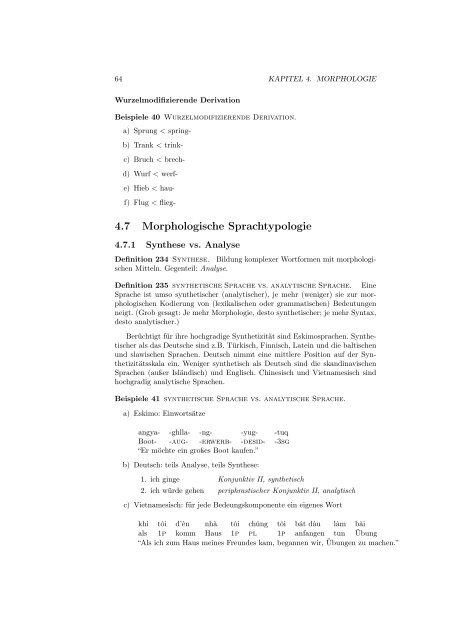Einführung in die Linguistik
You also want an ePaper? Increase the reach of your titles
YUMPU automatically turns print PDFs into web optimized ePapers that Google loves.
64 KAPITEL 4. MORPHOLOGIE<br />
Wurzelmodifizierende Derivation<br />
Beispiele 40 Wurzelmodifizierende Derivation.<br />
a) Sprung < spr<strong>in</strong>gb)<br />
Trank < tr<strong>in</strong>kc)<br />
Bruch < brechd)<br />
Wurf < werfe)<br />
Hieb < hauf)<br />
Flug < flieg-<br />
4.7 Morphologische Sprachtypologie<br />
4.7.1 Synthese vs. Analyse<br />
Def<strong>in</strong>ition 234 Synthese. Bildung komplexer Wortformen mit morphologischen<br />
Mitteln. Gegenteil: Analyse.<br />
Def<strong>in</strong>ition 235 synthetische Sprache vs. analytische Sprache. E<strong>in</strong>e<br />
Sprache ist umso synthetischer (analytischer), je mehr (weniger) sie zur morphologischen<br />
Ko<strong>die</strong>rung von (lexikalischen oder grammatischen) Bedeutungen<br />
neigt. (Grob gesagt: Je mehr Morphologie, desto synthetischer; je mehr Syntax,<br />
desto analytischer.)<br />
Berüchtigt für ihre hochgradige Synthetizität s<strong>in</strong>d Eskimosprachen. Synthetischer<br />
als das Deutsche s<strong>in</strong>d z.B. Türkisch, F<strong>in</strong>nisch, Late<strong>in</strong> und <strong>die</strong> baltischen<br />
und slawischen Sprachen. Deutsch nimmt e<strong>in</strong>e mittlere Position auf der Synthetizitätsskala<br />
e<strong>in</strong>. Weniger synthetisch als Deutsch s<strong>in</strong>d <strong>die</strong> skand<strong>in</strong>avischen<br />
Sprachen (außer Isländisch) und Englisch. Ch<strong>in</strong>esisch und Vietnamesisch s<strong>in</strong>d<br />
hochgradig analytische Sprachen.<br />
Beispiele 41 synthetische Sprache vs. analytische Sprache.<br />
a) Eskimo: E<strong>in</strong>wortsätze<br />
angya- -ghlla- -ng- -yug- -tuq<br />
Boot- -aug- -erwerb- -desid- -3sg<br />
“Er möchte e<strong>in</strong> großes Boot kaufen.”<br />
b) Deutsch: teils Analyse, teils Synthese:<br />
1. ich g<strong>in</strong>ge Konjunktiv II, synthetisch<br />
2. ich würde gehen periphrastischer Konjunktiv II, analytisch<br />
c) Vietnamesisch: für jede Bedeungskomponente e<strong>in</strong> eigenes Wort<br />
khi tôi d’èn nhà tôi chúng tôi bát dâu làm bài<br />
als 1p komm Haus 1p pl 1p anfangen tun Übung<br />
“Als ich zum Haus me<strong>in</strong>es Freundes kam, begannen wir, Übungen zu machen.”



